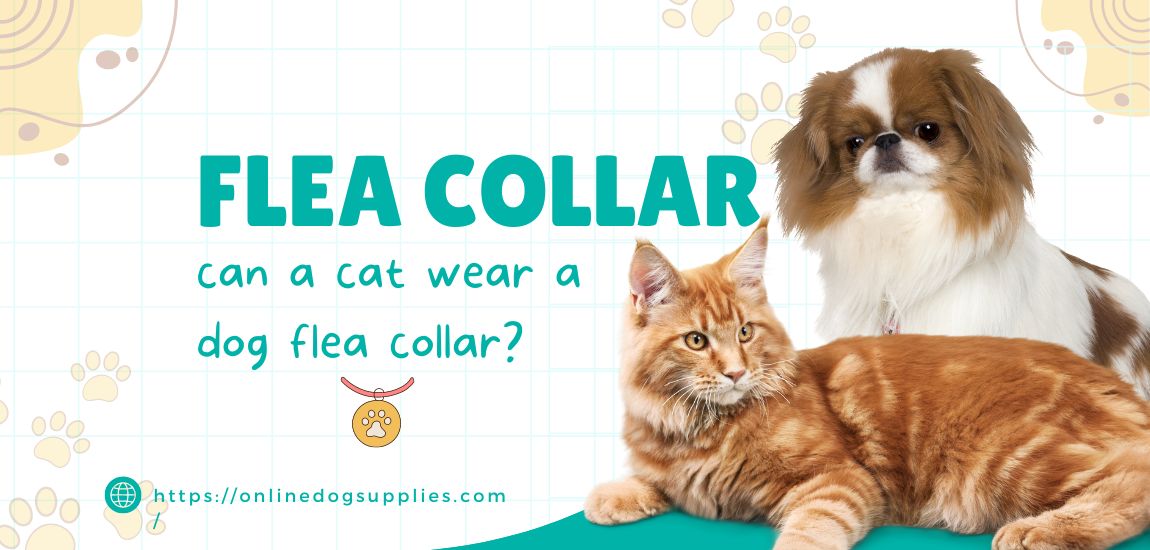Welcome, fellow pet enthusiasts! If you’re a cat owner who’s ever found themselves battling the dreaded flea invasion, you’ve probably wondered: Can a cat wear a dog flea collar? In this comprehensive guide, we’ll dive deep into this common query, providing you with all the essential information you need to make informed decisions about flea control for your feline friend. So, let’s paw-positively explore can a cat wear a dog flea collar together!
Understanding Flea Collars
Before we delve into whether a cat can wear a dog flea collar, let’s first understand what these collars are and how they work.
- What are Flea Collars?
- Flea collars are pet accessories infused with chemicals designed to repel or kill fleas and ticks.
- How Do They Work?
- These collars release active ingredients that spread across your pet’s fur, creating a protective barrier against fleas and ticks.
Can a Cat Wear a Dog Flea Collar?
Now, let’s address the burning question: Can a cat wear a dog flea collar? The short answer is no, and here’s why:
- Size Matters:
- Dog flea collars are often larger and contain higher concentrations of active ingredients than those designed for cats. This size disparity can pose serious risks to your feline friend.
- Toxicity Concerns:
- The chemicals in dog flea collars may be toxic to cats, leading to adverse reactions ranging from skin irritation to more severe health issues.
- Safety First:
- Your cat’s safety should always be a top priority. Opting for a flea collar specifically formulated for cats ensures proper dosage and minimizes potential risks.
Why Using a Dog Flea Collar on a Cat is Unsafe
- Different Formulations:
- Dog flea collars contain formulations that are tailored to the physiology of dogs, including their size, metabolism, and skin sensitivity. Cats have unique requirements, and using a product designed for dogs can lead to adverse reactions.
- Chemical Toxicity:
- The active ingredients in dog flea collars, such as permethrin or tetrachlorvinphos, can be highly toxic to cats, potentially causing neurological symptoms, seizures, or even death. Cats lack certain enzymes needed to metabolize these chemicals safely.
- Skin Sensitivity:
- Cats have more sensitive skin than dogs, and the chemicals in dog flea collars can cause severe irritation, burns, or allergic reactions when in contact with a cat’s skin.
- Ingestion Risks:
- Cats are fastidious groomers and may accidentally ingest chemicals from a dog flea collar while grooming, leading to poisoning and gastrointestinal issues.
- Potential Allergic Reactions:
- Cats may exhibit allergic reactions to the materials used in dog flea collars, such as rubber or plastic, which can result in itching, redness, and discomfort.
Alternative Flea Control Options for Cats:
While dog flea collars are off the table, fear not! There are plenty of safe and effective flea control options tailored specifically for cats:
- Topical Treatments:
- Products like spot-on treatments offer targeted flea control without the need for a collar. These treatments are applied directly to the skin at the base of the cat’s neck, where they can effectively repel and kill fleas.
- Oral Medications:
- Flea pills provide another convenient option for keeping your cat flea-free. These medications are administered orally and work by disrupting the flea’s life cycle.
- Natural Remedies:
- For those who prefer a more holistic approach, certain essential oils, such as cedarwood or lavender, can help repel fleas. However, it’s essential to use these remedies with caution and consult with a veterinarian before application.
- Environmental Control:
- Regular vacuuming, washing bedding in hot water, and treating outdoor areas where fleas may thrive can also help prevent flea infestations in your home.
Conclusion
In conclusion, while it may be tempting to consider using a dog flea collar on your cat, it’s crucial to prioritize their safety and well-being. Opting for flea control products designed specifically for cats is the best way to ensure effective protection without putting your feline companion at risk.
FAQs
- Can I Cut a Dog Flea Collar to Fit My Cat?
- Cutting a dog flea collar to fit your cat is not recommended, as it can alter the distribution of active ingredients and compromise its effectiveness and safety for your cat.
- What Should I Do If My Cat Has an Adverse Reaction to a Dog Flea Collar?
- If your cat experiences any adverse reactions after wearing a dog flea collar, such as excessive itching or skin irritation, remove the collar immediately and consult your veterinarian for further guidance.
- Are There Any Safe Alternatives to Flea Collars for Cats?
- Yes, there are several safe alternatives to flea collars for cats, including topical treatments, oral medications, natural remedies, and environmental control measures.
- How Often Should I Replace My Cat’s Flea Collar?
- The frequency of flea collar replacement varies depending on the product. Always follow the manufacturer’s instructions for proper usage and replacement intervals.
- Can I Use Dog Flea Collar on a Kitten?
- No, it’s not safe to use a dog flea collar on a kitten. Kittens have unique needs and sensitivities, so it’s essential to use flea control products specifically formulated for their age and size.


